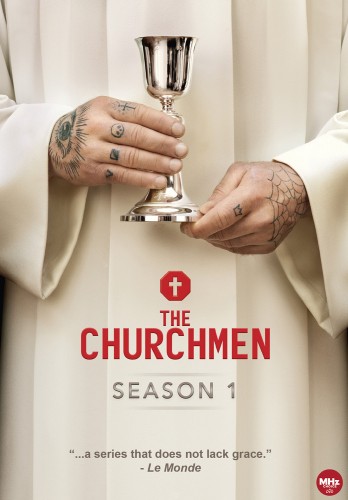The Churchmen — Season 1, Episode 7 Recap
The penultimate episode of the show’s inaugural season is the occasion of my last recap. (Evan Cogswell will recap the season finale at Catholic Cinephile.) I would like to use the occasion of my last recap to talk a little more about Father Bosco and perhaps make an observation about the filming.
The seminarians’ arcs each are moving to the point where we are meant, I presume, to wonder who will return for Season Two. Yann is less distraught by his Ecstasy-fueled seduction than by his muse’s casual dismissal of his calling as sublimated sexual tension. (My favorite scene in the episode was Yann’s confession to the elderly priest who is a lot less shocked by Yann’s actions than Yann himself.) Guillaume and Emmanuel continue in their will-they-or-won’t-they homoerotic dance. (This development is dully predictable but at least handle with some nuance.) Raphael maneuvers to get his brother a Catholic burial despite his suicide, and further conflicts arise between him and Jose as the former puts the brakes on the use of a property to get the squatters in.
On the administrative side, Fromenger’s dismissal is delayed when discussions between the Vatican and a representative of the Chinese faithful break down. Turns out the man is an admirer of Fromenger, and the Vatican tells Roman that he has to wait to gleefully dismiss the thorn in his side.
The series does tend to lean a little heavily on the contrast between individual faith (good) and institutional structures (bad, bad, bad). The Pope is presented as stubbornly caring more about looking bad than about what is right, and (as with Roman) perpetually aggravating his less volatile, more politic assistants who apparently have little to no sincere admiration or even respect for the the church’s leaders.
Within that range of mostly stock figures, Dominique (Father Bosco) is an interesting case. Of the characters, he is the one who has changed the most, going from a staunch defender of Father Fromenger to an a rabidly hostile detractor. Is this credible?
Sure. In fact, I was kicking myself through most of this episode for not anticipating this response. Earlier I expressed surprise that Dominique did not simply go to Etienne and ask him about the money. But Father Bosco represents a type of Christian I’ve interacted with–a volatile, white-knuckler, who will praise you to the moon one second and totally dismiss you the next, who will have moments of profuse self-righteous arrogance followed by moments of extreme anger and hostility towards anyone who might have witnessed his own imperfections. (Note Bosco’s hostility towards anyone who sees him struggling with his heart condition.)
The term “white-knuckler is associated with Alcoholics-Anonymous, but I don’t mean to imply Bosco is any kind of addict. (He might be addicted to exonerating himself, but who isn’t?) The term as I understand it, refers to someone who tries to do something nearly impossible–addiction recovery, living a Christian life–fueled by sheer will power rather than a strict adherence to the program/rules. It is telling and quite interesting that this episode has a sustained scene with a communion service. It is painful to watch as each character who is conflicted about his own behavior confronts the rhetoric and ritual designed to make him keenly aware of that fact. Bosco is in that weird place where he is not entirely hardened in his heart but cannot sustain his efforts with his own strength. Still, he resists the softening effects of the ritual, mostly because the hypocrisy of those around him sickens him. I get that, too, even though I haven’t exactly felt it towards a person I previously admired.
That said, people like Bosco are particularly hard to interact with.While the show deftly illustrates that these sorts of people’s alternating praise and attacks are seldom really about the other person, and while that illustration makes it a little easier to sympathize with Bosco and people like him, I wonder if Fromenger is ever going to be called upon to forgive Bosco. Given the latter’s heart condition, I fear it will be some sort of death bed reconciliation, one that elides the more vexing and painful questions that such people present to us. Initial forgiveness is easy, but what if you think the other person is too weak or blind to alter his or her behavior?
On a more formal note, I thought it interesting how many scenes ended with a long shot of the action that had just been shown in a more traditional two-shot scene. This inversion of the more conventional sequencing (long shot as establishing shot and then cut to more immediate action) is not an innovation, but it is used effectively in the show to create some emotional distance. In this episode, these cuts sometimes happen after some conflict-laden scene, and it underlines the emotional ambivalence. Raphael argues with his sister-in-law and then is shown at the park with her in the kids. The Pope expresses some petulant emotion in discussions of the Chinese negotiations and the camera backs away.
Whether intentional or not, these cuts create a sort of visual reminder of the often ugly disconnect between the long-term perspective and the immediate concerns of the character. How a situation looks when we are in the middle of it is quite different from how it looks if and when we are able to step back and take a broader view.
Reminder: You can watch MHz Network shows live on the web or purchase individual episodes to screen on Roku without a subscription. For more information, see MHz Network.
Previous Episodes:
Episode 1 (1More Film Blog)
Episode 2 (Catholic Cinephile)
Episode 3 (1More Film Blog)
Episode 4 (Catholic Cinephile)
Episode 5 (1More Film Blog)
Episode 6 (Catholic Cinephile)

